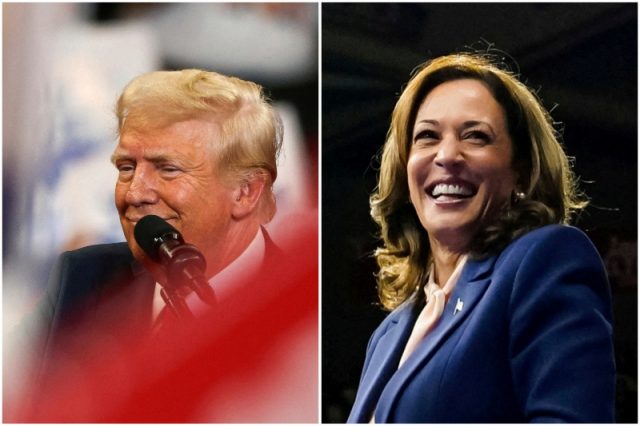
- Former president Trump promotes deregulation
- Democrats’ Harris supports stricter AI guidelines
- Shared concerns over China tech domination
LONDON (Thomson Reuters Foundation) — Artificial intelligence may not be a defining issue for U.S. voters, but it hit the headlines after this month’s presidential debate when Taylor Swift endorsed Kamala Harris and said her fears of AI misinformation drove her to speak out.
Swift said a fake social media image that former president Donald Trump posted in August, which appeared to show her asking people to vote for him, prompted her to make her intentions clear in the face of misinformation being spread using AI.
Democratic Vice President Harris, a Californian with ties to Silicon Valley, has adopted a cautious approach to AI innovations, while also promoting American leadership in tech.
Trump, the Republican candidate, has tended to speak in favor of deregulation although he too sees threats from global rivals, especially China, in the field of AI and other cutting-edge technology.
So what would a Trump or Harris presidency mean for AI?
What is Harris’ position?
During the presidential debate, Harris stressed the need to invest in “American-based technology” so that the United States could win “the competition for the 21st century” or the “race on A.I. and quantum computing.”
But if she wins, Harris is likely to take a cautious approach to AI, much as her predecessor President Joe Biden has done.
Last October, Biden signed an executive order to reduce the risks that AI poses to consumers, workers, minority groups and national security.
The order directed federal agencies to set new high standards for AI safety and security, for safeguarding equity and civil rights in AI and for promoting competitive markets in the industry.
Like Biden, Harris views technology as a national security issue, with China seen as the main threat to U.S. dominance.
In June, the Biden government issued draft rules for banning or requiring notification of certain investments in AI and other tech sectors in China that could threaten U.S. national security.
In her acceptance speech at the Democratic National Convention in August, Harris linked AI to a struggle for dominance with China.
“I will make sure that: We lead the world into the future on space and Artificial Intelligence. That America – not China – wins the competition for the 21st century. And that we strengthen – not abdicate – our global leadership,” she said.
The Democratic Party’s policy platform promised a Harris administration would be set on “seizing the promise and managing the risks of AI” to ensure it serves the public interest.
“While AI is helping to cure diseases, predict the weather, and transform education, it’s also being used to clone voices, commit fraud, institutionalize bias, and undermine democracy,” it said.
The policy platform also said that workers should get a voice in how AI is used in their workplace and share fairly in any economic gains AI produces.
Harris has previously expressed concerns about AI-linked discrimination or bias and the Biden administration has published a blueprint for an AI Bill of Rights and issued new guidance on combating algorithmic discrimination.
“Vice President Harris’ concerns about the harmful implications of AI are valid, as bias in AI can disproportionately harm marginalized communities,” Clara Langevin, AI policy specialist at the Federation of American Scientists, a policy research and advocacy group, told the Thomson Reuters Foundation.
The Democrats’ policy platform says a Harris administration will continue to advocate for the safe and secure development of AI and invest in the AI Safety Institute to create guidelines and best practices for mitigating AI risk.
A Democratic administration would also ban voice impersonations and act to strengthen protections in critical sectors like healthcare, financial services, housing, education and transport.
Voice impersonation has been a particular thorn in the side of politicians, with the chair of the Federal Communications Commission telling telecom companies to crack down on fraudulent political robocalls that use AI.
What would a Trump administration mean for AI?
Trump has pushed for lighter regulation on AI and has said he would rescind Biden’s executive order and ban the use of AI “to censor the speech of American citizens on day one”.
The Republican policy platform reiterates this pledge.
“We will repeal Joe Biden’s dangerous Executive Order that hinders AI Innovation, and imposes Radical Leftwing ideas on the development of this technology. In its place, Republicans support AI Development rooted in Free Speech and Human Flourishing,” it states.
Trump has also been endorsed by Elon Musk, who owns social media platform X, and other powerful tech billionaires.
In 2019, while in office, Trump signed an executive order asking federal government agencies to dedicate more resources and investment into research, promotion and training on AI.
The White House at the time said investment in AI is “critical to creating the industries of the future, like autonomous cars, industrial robots, algorithms for disease diagnosis, and more.”
And in 2020, Trump signed an executive order setting guidance for federal agency use of AI in government decision-making, setting nine principles for the design, development, acquisition and use of AI in government.
Despite this guidance, some analysts believe Trump will be less cautious than Harris on AI.
“Trump will continue to push deregulation and allow industry to operate with little to no accountability,” Nicol Turner Lee, senior fellow in governance studies at the Center for Technology Innovation at the Brookings Institution, told the Thomson Reuters Foundation.
On tech and national security, Trump and Harris have similar positions. The Biden administration has imposed tariffs on Chinese imports, including a 100% duty on electric vehicles.
The Democratic Party’s 2024 policy platform includes restricting China’s access to advanced technologies and reshoring supply chains for “technologies critical for the 21st century.”
Trump has proposed phasing out Chinese imports of goods such as electronics, steel and pharmaceuticals over four years.
Lilian Coral, head of the Open Technology Institute at liberal think tank New America, said the key priority for whoever wins should be working with other nations to regulate AI.
“A global model of AI development that is cooperative and brings nations together is what is most needed,” Coral said.
Langevin said a big unknown was what risks new advanced models of AI could pose.
“The next administration, be it Trump or Harris, must be assertive,” she said.
—Reporting by Adam Smith, @adamndsmith, Editing by Ana Nicolaci da Costa









